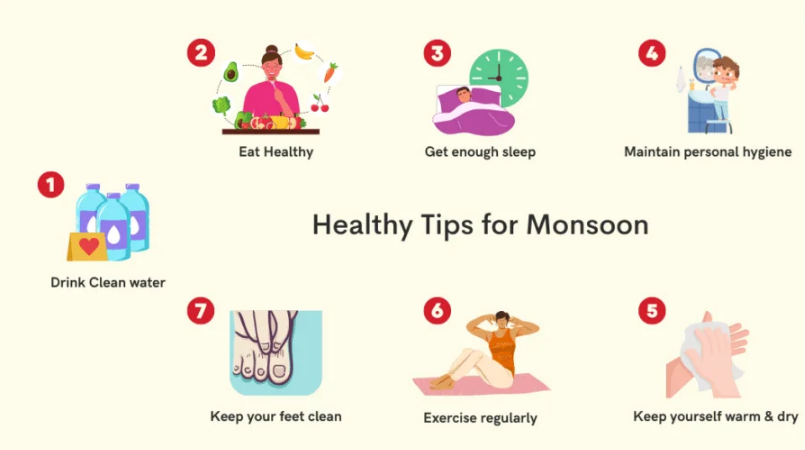
Monsoon 2025 Health Guide: 5 Common Illnesses, Prevention Tips, and Nutrition Boosters
The monsoon season brings a number of diseases, despite being a pleasant respite from the sweltering summers. During the rainy season, waterborne and vector-borne illnesses and infections are prevalent. But according to our specialist, a weak gut is the first sign of most seasonal infections. She offers some advice on how to improve your nutrition throughout the monsoon season.
Although the monsoon provides relief from the oppressive heat, it also harbours a number of diseases. Waterborne and vector-borne infections are among the prevalent diseases during this time. During the rainy season, people have also experienced respiratory and fungal diseases. Additionally, cases of gastrointestinal disorders are frequent. But according to food inventor and co-founder Aishwarya Bhatnagar of Better Nutrition, which is well-known for its biofortified rice and atta, most seasonal infections begin with a weak gut. She offers some advice on how to improve your nutrition throughout the monsoon season.
Five Typical Monsoon Illnesses and How to Avoid Them
As previously stated, the common monsoon ailments fall into five categories:
1) Waterborne diseases
Thanks to contaminated water, diseases like typhoid, cholera, and dysentery are pretty common during the monsoon season.
2) Vector-borne diseases
Due to continuous downpours and not cleaning of spaces, at times, water gets stagnant resulting in mosquito breeding. This eventually leads to dangerous diseases like malaria, dengue fever, and chikungunya.
3) Fungal infections
The atmosphere remains humid, which makes people prone to fungal infections such as ringworm and athlete’s foot.
4) Respiratory infections
Since the weather remains moist, cold, and damp, respiratory infections like bronchitis and pneumonia are common in the rainy season.
5) Gastrointestinal infections
And lastly, gastrointestinal infections like diarrhea and vomiting happen a lot during the monsoons because of the consumption of contaminated food.
To tackle this, the preventive measures that are usually suggested include:
Don’t drink unfiltered and raw water
Avoid eating outside food and unclean vegetables
Always wear protective clothing
Use mosquito nets and repellents
Maintain clean and dry surroundings
Practice good hygiene
How to Bolster Your Nutrition During Monsoons 2025
Bhatnagar, however, feels “that what we eat during this season matters far more than what we avoid.”
Consider this: weakened guts are the initial cause of most seasonal infections. However, processed grains, inert carbohydrates, and foods that may satisfy but don’t fuel are frequently found in our diets. She emphasises that this is the point at which minor adjustments can have a significant impact.
She suggests 5 ways your diet can be monsoon-friendly:
1) Consider Your Grains Differently
Replace overly processed rotis and over-polished rice with staples high in iron and zinc, such as rice, millets, or naturally biofortified atta. In addition to having more vitamins, these grains are also easier to digest, particularly when fermented or cooked slowly.
2) Take Care of Your Gut
Incorporate prebiotic foods such as sweet potatoes, raw banana flour, and tiny amounts of kanji or fermented pickles cooked at home. These promote beneficial gut flora, which strengthens the body’s defences against monsoon infections.
3) Drink More Than Just Water to Stay Hydrated
Yes, plain water is necessary, but so are electrolytes and minerals that are accessible. Try adding tulsi, ginger, mint, or fennel to your water. Restoring trace minerals lost through perspiration or minor illnesses can be accomplished with a small pinch of Himalayan salt and lemon in warm water.
4) Consume Food for Immunity as Well as Energy
Incorporate meals high in choline and omega-3 fatty acids (such as flaxseed or cold-pressed mustard oil), which promote cellular immunity and mental clarity, which are frequently affected on depressing days. A wise move is to substitute cow ghee or mustard oil for highly processed refined oils as your base fat.
5) Smart Meals Rather Than Fast Fixes
Both toddlers and nursing mothers are at risk at this time. Instead, focus on iron-rich dals, sesame ladoos, soaking dry fruits, whole grain porridges with ghee and jaggery, and sensible everyday meals rather than artificial “health drinks.” These provide profound nourishment without using excessive amounts of sugar or chemicals.
“Monsoon is about equilibrium, not terror. You don’t need to add further layers of immunity when your staple foods are strong enough, the rotis are high in zinc, and the khichdi is more than simply filler. It simply turns into a daily routine. Aishwarya Bhatnagar concludes, “And that’s the kind of food wisdom we need: gentle, intelligent, rooted in both science and tradition.”


